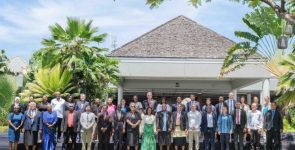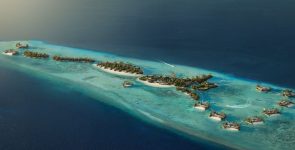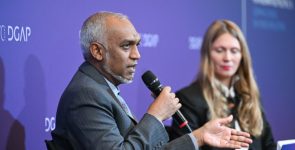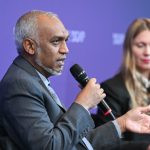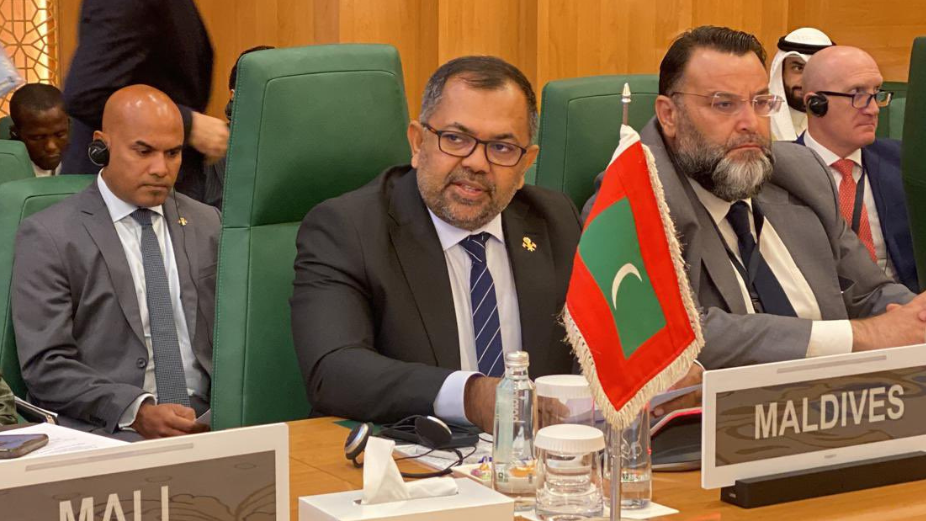
The Minister of Foreign Affairs, Moosa Zameer, has embarked on an official visit to the Kingdom of Saudi Arabia, marking a significant step in the Maldives’ ongoing strategy to deepen ties with Gulf Cooperation Council (GCC) nations. This visit, initiated at the invitation of Saudi Foreign Minister Prince Faisal bin Farhan Al-Saud, comes on the heels of Minister Zameer’s recent official visit to Bahrain, reflecting the Maldives’ broader effort to secure economic investments and political support from key Arab states.
The visit to Saudi Arabia highlights the Maldives’ focus on strengthening relationships with GCC countries, particularly Saudi Arabia and the United Arab Emirates (UAE). These nations have become increasingly important partners as the Maldives seeks to diversify its economic dependencies and enhance its geopolitical position in the Indian Ocean region. The Maldives is particularly interested in securing investments for the expansion and modernisation of Velana International Airport, a critical infrastructure project vital to the country’s tourism-driven economy.
Minister Zameer’s visit is also expected to explore avenues for financial assistance to support the Maldives’ national budget and increase its foreign currency reserves. The Maldives has been grappling with economic challenges, including pressures on its budget and the need to increase its USD reserves, which are crucial for maintaining economic stability and ensuring the country can meet its financial obligations.
The Maldives’ strategic outreach to the GCC nations, particularly Saudi Arabia and Bahrain, is part of a larger effort to balance its relations with other regional powers, including India and China. The island nation has historically maintained close ties with Saudi Arabia, benefiting from significant economic aid and development financing. This relationship has deepened in recent years, with the Maldives consistently supporting Saudi positions in international forums, further solidifying their bilateral ties.
Accompanying Minister Zameer on this visit are key figures from the Maldives’ economic and financial sectors, including the newly appointed Governor of the Maldives Monetary Authority, Ahmed Munawar, and the Managing Director of Maldives Airports Company Limited, Ibrahim Shareef Mohamed. This high-level delegation signifies the importance of the visit, as the Maldives seeks to secure concrete economic benefits from its strengthened ties with Saudi Arabia.
During his meetings in Riyadh, Minister Zameer is expected to discuss a wide range of topics with Saudi officials, including investment opportunities, tourism collaboration, and cultural exchanges.
The Maldives’ growing alignment with GCC nations is a testament to the shifting dynamics in the Indian Ocean region, where Gulf states are increasingly asserting their influence. This strategic pivot is reminiscent of former President Abdulla Yameen’s foreign policy approach, which heavily leaned on China and Arab nations, particularly Saudi Arabia, to drive economic development and secure political backing. Yameen’s tenure was marked by a significant deepening of ties with Saudi Arabia, highlighted by extensive financial agreements and symbolic gestures that reflected the Maldives’ increasing reliance on Gulf states. His administration’s close relationship with Saudi Arabia was part of a broader strategy to reduce dependence on traditional partners like India, instead embracing the economic might of China and the wealth of the Gulf.
Today, as the Maldives seeks to strengthen its ties with the GCC under President Mohamed Muizzu, there are clear parallels with President Yameen’s approach, although the current administration appears to be balancing these relationships more cautiously within a broader geopolitical context. The continued engagement with Saudi Arabia and other GCC nations reflects a desire to maintain robust economic partnerships and leverage the strategic importance of the Maldives within the region, while also navigating the complex interplay of influence between major global powers.
The outcomes of this visit are likely to play a significant role in shaping the future trajectory of Maldives-Saudi relations and the broader regional strategy.





